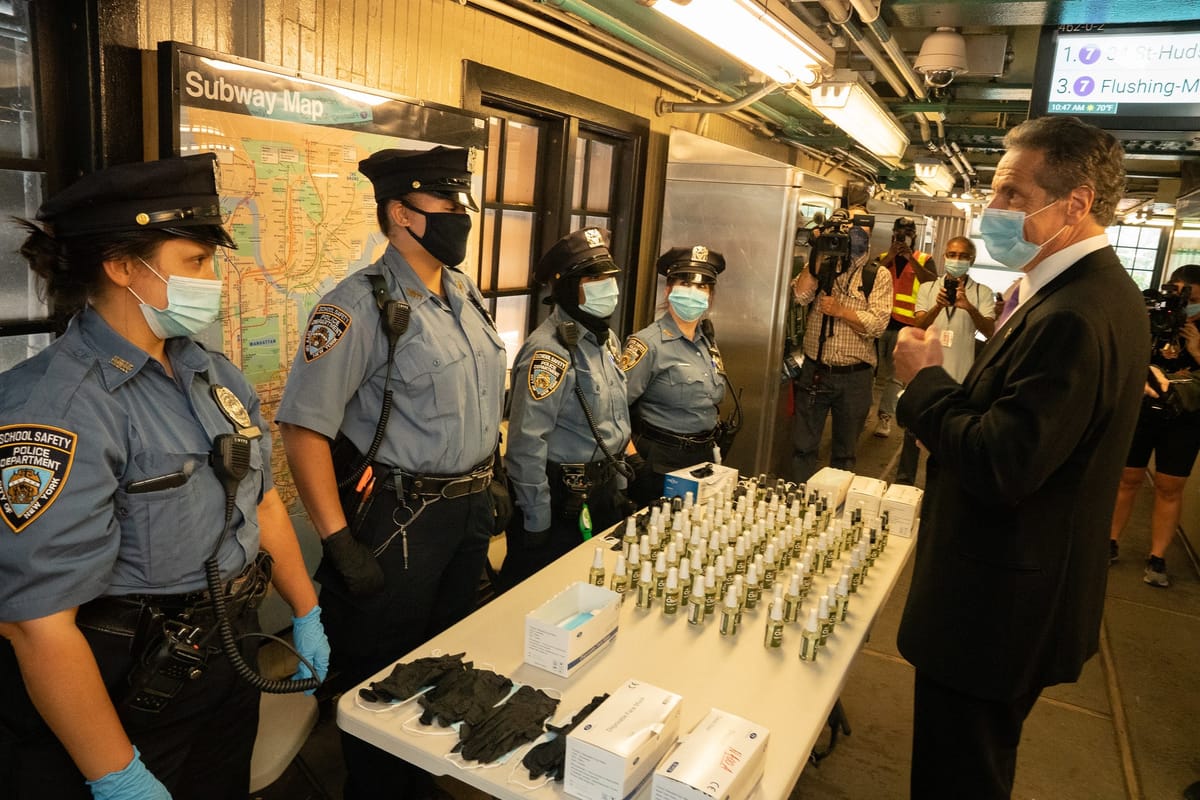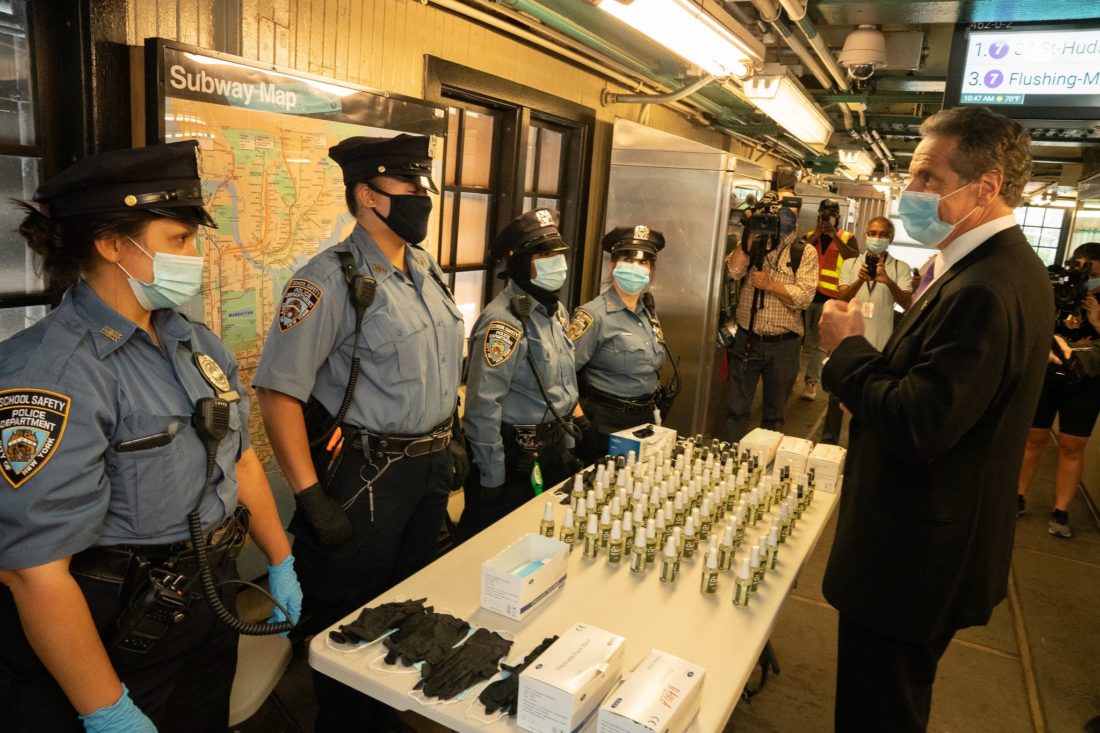School Safety Agents Upset Over Oversight Transfer from NYPD To DOE


When school safety agent Quiann Simpkins of East Flatbush learned about Mayor Bill de Blasio’s intention to transfer the oversight of school safety agents from the New York Police Department (NYPD) back to the Department of Education (DOE) last June, she found it to be “a little weird”. While she was not shocked by the calls for police reform in the aftermath of the murder of George Floyd in Minneapolis, she did not understand why school safety agents like herself were also being targeted.
“We don’t have any weapons,” says Simpkins who has been a school safety agent (SSA) for 16 years, and works at a Coney Island school. “We get totally different training from the police officers. We serve the schools. We do not have any power to give detentions or make arrests. People do not understand our job.”
It is a job that might be in limbo as the discussion continues over who should oversee the SSAs, 90% of whom are Black and Hispanic and are 70% women. The last time this issue came up was back in 1998, when the then-Board of Education transferred oversight of school safety to the NYPD.
Back in February, the City Council held a hearing over the issue, which the New York Post described as “heated”. Just last week, on Monday, April 26th, Community Education Council (CEC) 16 in Bed-Stuy held an online town hall that included panelists from the NYPD, DOE, the United Federation of Teachers (UFT), and Gregory Floyd, the President of Teamsters Local 237, which represents the city’s SSAs. The reason this town hall was held, explained CEC 16 President, Nequan McLean, was because of a letter President Floyd sent out to all CECs about his concerns about the school safety transfer, which he called, “a dangerous scheme”.
“[I]t satisfies calls to ‘Defund the Police’ stemming from this past summer’s tragic shootings of unarmed black civilians,” Floyd’s letter reads. “Reform of police practices is important, but targeting School Safety for removal from NYPD is wildly inappropriate.”
During the two-hour town hall, DOE Office of Safety and Youth Development Senior Executive Director, Mark Rampersant, presented a brief slide show to explain how the DOE would train and operate the agents while also keeping in community with the schools they will work for. But some of the panelists, along with the other members of CEC16 and even the public, were not satisfied with the presentation.
“The work in front of us is massive,” says UFT Vice President Sterling Roberson. “We have many kids with massive learning loss, especially in economically disadvantaged communities. What are the mental health services that we’re going to have to deliver? What are the academic interventions that we’re going to have to put into place? So while we have this discussion, we also think about ‘Is this in the best interest of our schools?’, and ‘Can this transition be added?’ “Is this too much that will take us back when we have so much to do?’”
There were concerns over whether all the city’s SSAs would be laid off as part of this transfer, which Rampersant insisted would not happen. He also said there would be vetting and background checks given to new hires, much like how the NYPD does now.
But agents who called in to voice their concerns told the town hall that they felt they were not being heard, or considered, during this process.
“You have school safety under a lot of stress,” says a woman named Marvella Glen. “We take our job very seriously, and for most of us, it’s a career. No agent was in a meeting, and I think that is very unfair, and we feel like we’re being bullied. Everyone in the DOE administration has a lot to say on this, and we feel like you’re not being honest with us. I’m really curious to know what’s going. And you can’t say you don’t know, that’s a cop-out.”
It took 20 seconds before anyone on the panel responded to Glen’s comment. Council of Schools Supervisors and Administrators First Vice President Rosemarie Sinclair explained that she understood how Glen felt and assured that she was important as a safety agent. Kenyatte Reid, the Executive Director of the DOE’s Office of Safety and Youth Development, said that the DOE doesn’t want to stay silent on this work.
“There is nothing that has been created behind the scenes,” Reid says. “I know that feels that way and it’s very easy to fall into fear. But we’re working every day alongside your colleagues to make sure your voices are heard.”
But George Geller, the special assistant to President Floyd at Local 237, believes those who support the transfer must speak to the agents as well.
“They need to talk to the Black and Hispanic women who do this work,” Geller told Bklyner. “These are familiar, friendly faces at the schools, and the kids prefer to talk to them; they look like these faces.”
Geller also believes the idea of transferring the oversight from the NYPD to the DOE is nothing more than a public relations stunt done by “frantic, out-of-touch liberals”.
“It’s for appeasing the public sentiment,” he says. “It’s creating a problem that does not exist. It’s a symbolic dismantling for which there was no public call. To target this minority force is a travesty. School safety agents do not terrorize schools. There’s no crisis. It’s the best thing the NYPD has.”
What concerns Simpkins is the false narrative that has been said about SSAs like herself by those seeking this transfer, such as Public Advocate Jumaane Williams, who claimed SSAs have abused students, and City Councilwoman Helen Rosenthal from the Upper West Side, who said back in February that SSAs are part of the NYPD, a “paramilitary” organization.
“They say we’re looking to lock children up,” Simpkins told Bklyner. “But we have children of our own in the school system.”
Some in Brooklyn feel the police should not be involved in anything when it comes to minors at school.
“I do support the transfer,” says Sharon Wedderburn, the Chair of Youth and Education Committee at Community Board 8 in Crown Heights. “The last transfer in 1998 occurred [from the Board of Education to the NYPD] under a mayor who was detrimental to our community. If you’re under the age of 18, you don’t make adult decisions before the brain is not fully formed. If children are having a fight, police should not be called. It can be resolved in other ways.”
Wedderburn also pointed out that during CEC 16’s town hall, President Gregory Floyd was posturing by saying crime and violence were increasing in schools, and the amount of weapons being confiscated has also increased. Rampersant told Floyd during the town hall that it was not true.
The DOE denies such claims, saying that the claim that a historic amount of weapons being confiscated this year is false.
“Our schools are the safest they have ever been and a record low number of weapons have been recovered this year, any claim otherwise is a gross exaggeration,” says DOE deputy press secretary Nathaniel Styer. “We are bringing our current staff of SSAs back to the DOE as part of our goal to provide students with complete safety.”
But some feel not enough information is being given with this transfer. President Floyd expressed dismay during the town hall that there have been too few meetings over how to plan this transfer, and some members of the public, such as education advocate, Mona Davids, who launched the New York City School Safety Coalition a month ago, were unhappy by the lack of engagement from the DOE.
“This lack of transparency has really been quite appalling,” Childs says. “There’s been zero engagement. No one is consulting us, the parents.”
Even Simpkins points out the DOE has not sent out any survey to the parents about this issue.
According to DOE deputy press secretary Styer, engagement is in the works.
“This week, the team working on this transition presented to the Chancellor’s Parent Advisory Council and the Citywide Council for English Language Learners and laid out the plans for the transition, the timetable for further engagement, and received feedback. Transition leadership will continue meeting with Citywide parent leadership bodies in the upcoming month. This week is just the beginning of the process, which will include a survey of community stakeholders,” he told Bklyner.
Styer also adds that the DOE intends to start a broader outreach this month to the SSAs.
Another aspect of this debate that is on the minds of skeptics is the fact that there will be a new mayor in January 2022, just before the transfer is expected to be complete in June 2022.
Mona Davids pointed out that the next mayor may change their mind on this issue. Simpkins herself has been following the mayoral debates and notices there seems to be a toss-up between who supports the transfer and who is against it.
“It’s nerve-wracking,” she says. “I’m not exactly sure how this will play out.”
In the days following last week’s town hall, CEC16 President Nequan McLean sent out a letter to the district to give his thoughts on what he learned from the town hall. To him, it seemed as if not much was being done by the Mayor.
“City Hall is dragging its feet on planning for SSA transition,” his letter reads. “Perhaps, like many other politically complicated policy decisions, the mayor is fearful of conflict and hoping to punt to the next administration. City Halls’ absence at the event was perhaps symbolic of the mayor’s support for this transition. Unfortunately, the uncertainty caused by indecision will be the burden of brown and black workers and families who are at the center of this conversation. We need concrete answers.”
Bklyner reached out to the Mayor’s Press Office about this issue but did not receive a response.
This story has been updated to correct that Mona’s last name is Davids, not Childs as originally published.




